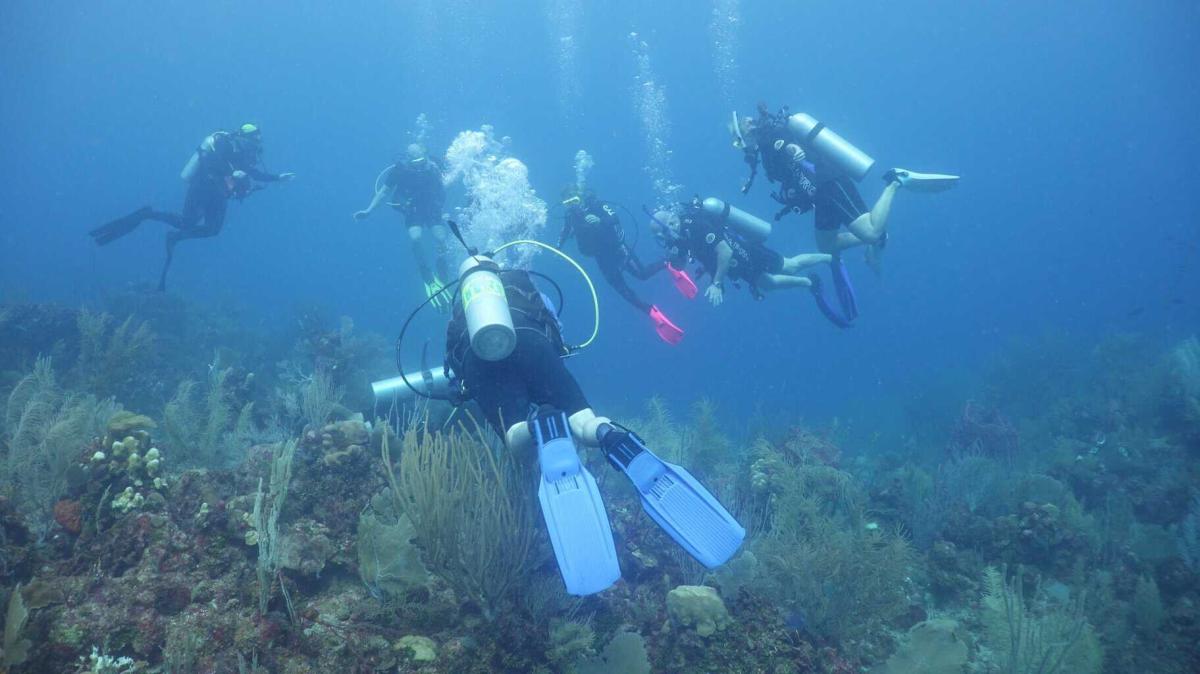
There are several types of compressed gas divers (SCUBA divers) and many reasons people dive. Divers either dive for recreation, or as part of their job. Good health is certainly important for the physicality of the sport or job, but diving brings in other special components, such as exposure to increased pressure and immersion in water. A medical evaluation by a provider trained in Diving Medicine is recommended and sometimes required. Hennepin Healthcare's Hyperbaric Medicine Department offers comprehensive dive physicals for divers of all capacities.
Working Divers
- Commercial Diving: Commercial divers work underwater and perform tasks such as installation, inspection, salvage and maintenance of underwater structures. They may work underwater on structures such as pilings, bridges, ships, cables, nuclear power plants and pipelines/oil rigs. They may work as independent contractors or for a company or a union. Our providers are DMAC (Diving Medical Advisory Committee) certified and follow guidelines as outlined by the ADCI (Association of Diving Contractors International) and IMCA (International Marine Contractors Association).
- Public Safety Diving: These divers are public safety personnel who perform underwater work for law enforcement, EMS, or other search and recovery operations. They are often employed by counties or cities, usually through a specific police, fire or EMS agency. They can be full-time employed or employed on a volunteer basis. They are trained to respond to emergencies, administer first aid, and participate in search and recovery operations underwater.
- Scientific Diving: These scientists work underwater observing, documenting and gathering data for research. These divers may be associated with a public or private marine science institution, government agencies who oversee fisheries, wildlife and conservation endeavors, or a university with marine sciences programs. Our providers have been trained and follow guidelines outlines by the AAUS (American Academy of Underwater Sciences).
- Military divers are trained in several branches of the military. The military maintains the health and training of these divers.
Recreational
Those who dive for recreational reasons may require a medical evaluation to participate in SCUBA diving activities. Diving can be both thrilling and meditative but also physically challenging. It is a good idea to see a provider trained in Diving Medicine for your dive physical before you participate in recreational SCUBA diving. Our providers follow WRTC (World Recreational SCUBA Training Council) and UHMS (Undersea and Hyperbaric Medicine) guidelines. Our providers are also DAN (Divers Alert Network) referral physicians.
Why is a diving physical different than a regular physical?
Hennepin Healthcare's UHMS board-certified physicians are Minnesota's most knowledgeable diving medicine doctors. In addition, they are DMAC certified to perform official diving physicals for commercial divers. Diving can put a diver at increased risk for middle ear and sinus barotrauma, decompression sickness (the bends), and pulmonary barotrauma, with can predispose to arterial gas embolization, a life threatening condition. Underlying medical conditions that could put a diver at risk for loss of consciousness leading to drowning must also be evaluated. Besides a thorough medical history and physical exam, a diver's physical exam may include much more. Exam fees are transparent, which has been one of the past challenges at institutions that perform these physicals. Hennepin Healthcare's Hyperbaric and Diving Medicine Clinic currently performs about 30 of these physicals per year and the numbers have been increasing. Many of the medical tests that need to be performed can be done conveniently right in the Diving Medicine Clinic at HCMC now.
Roatan, Honduras
Dr. Logue and Ryan Wudtke on a dive in Honduras[/caption] Members of Hennepin's Hyperbaric and Diving Medicine team volunteer annually in Roatan, Honduras, dedicating time to the island's health clinic and hyperbaric chamber. The clinic and hyperbaric chamber, currently the only Diving Medicine clinic on the island, is always busy with patients. It also serves as the primary emergency care facility for injured divers suffering from decompression sickness or other diving injuries in the Western Caribbean. The Miskito people, an indigenous group residing along Honduras' Caribbean coast—known as the Mosquito Coast—rely heavily on scuba diving for lobsters, conch and other seafood for their livelihood. These artisanal divers sometimes face unsafe working conditions that lead to severe cases of decompression sickness and the hyperbaric chamber on Roatan is one of the only places where they can go to receive treatment. Dr. Christopher Logue, the Medical Director of Hyperbaric and Diving Medicine at Hennepin Healthcare, leads a team to support this under-resourced health clinic. In addition to his medical expertise, Dr. Logue is a certified NAUI and PADI SCUBA diving instructor and has trained many healthcare professionals at Hennepin to become certified open water scuba divers. This year, Ryan Wudtke, Interim Manager for Hyperbaric Medicine and Limb Preservation, joined the group. (Top photo is of the group.) Dr. Christopher Logue, Medical Director of Hyperbaric and Diving Medicine at Hennepin Healthcare, leads a team to support this under-resourced health clinic. In addition to his medical expertise, Dr. Logue is a certified certified NAUI and PADI SCUBA diving instructor and has trained many healthcare professionals at Hennepin to become certified open water scuba divers. This year, Ryan Wudtke, Interim Manager for Hyperbaric Medicine and Limb Preservation, joined the group.



